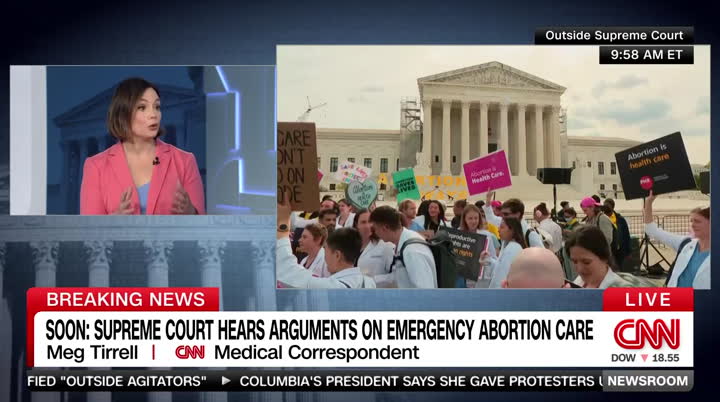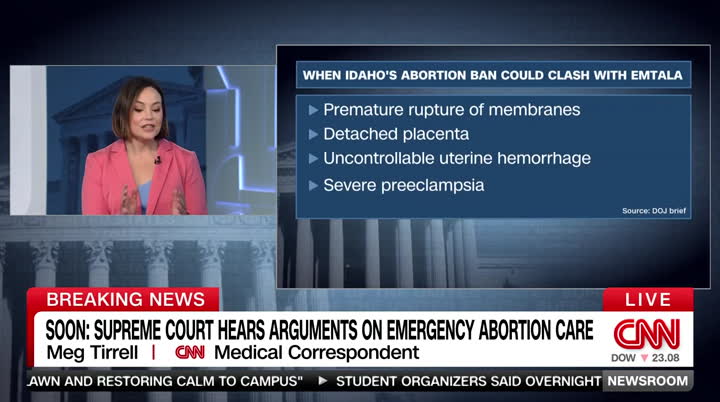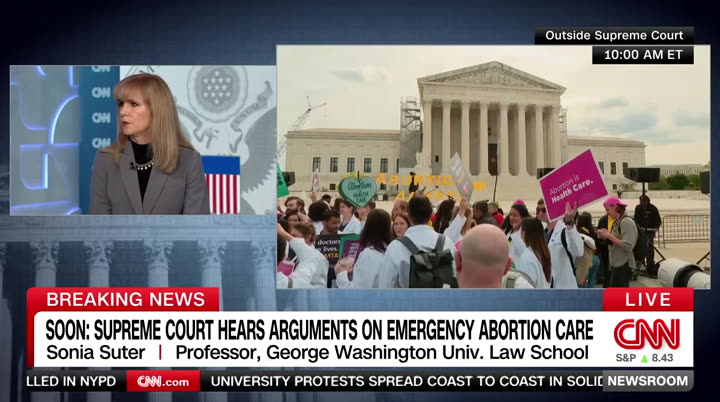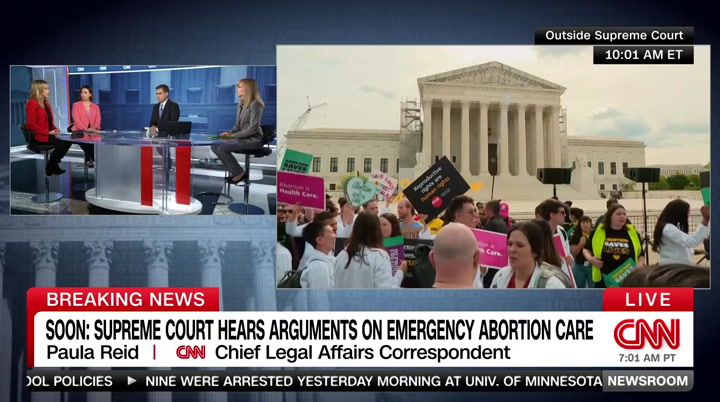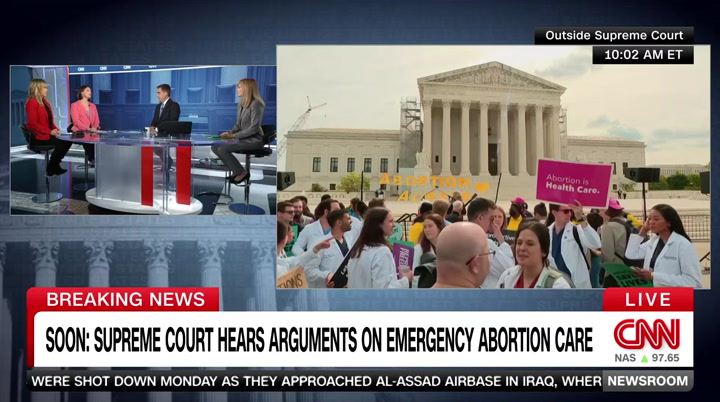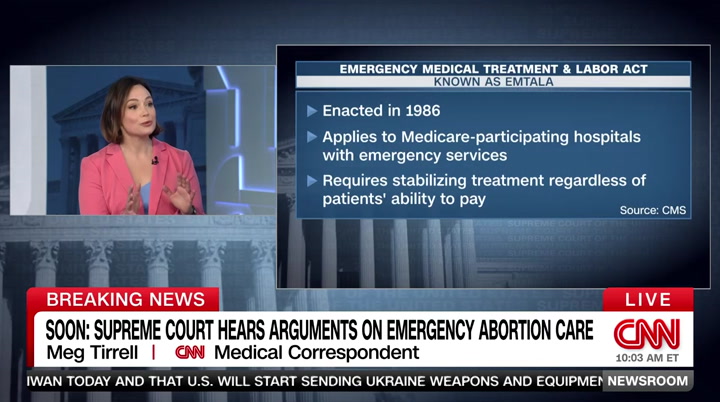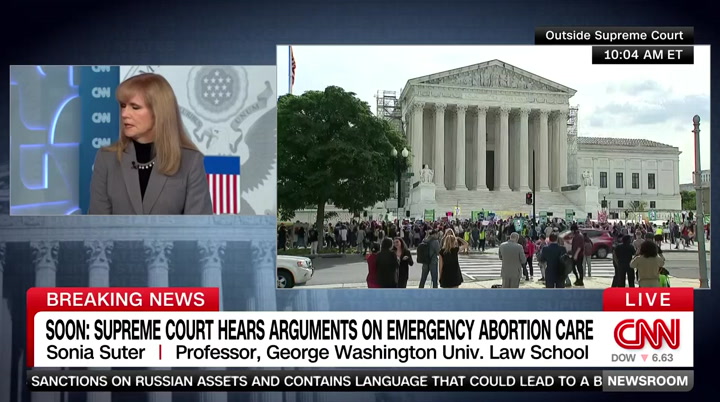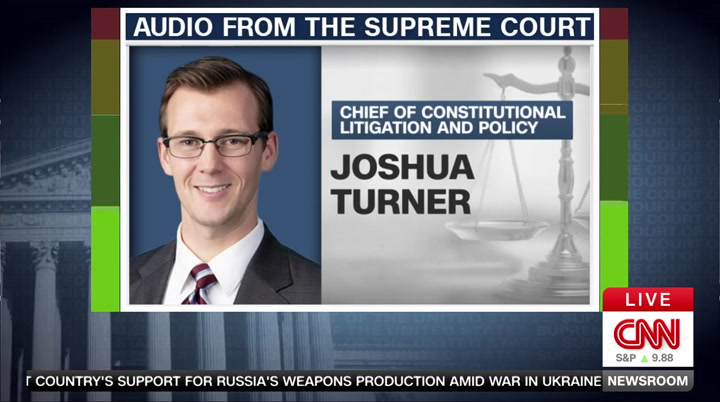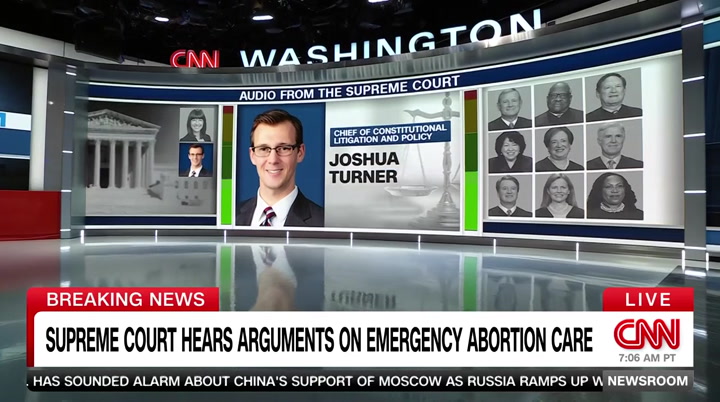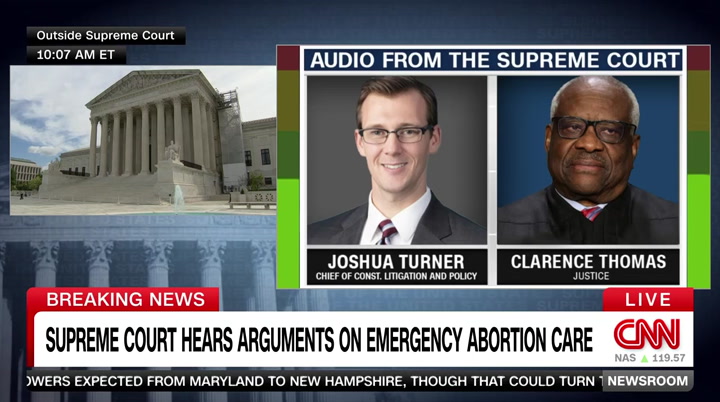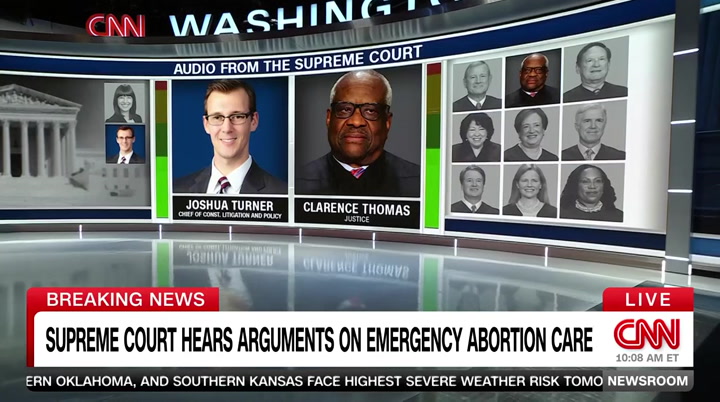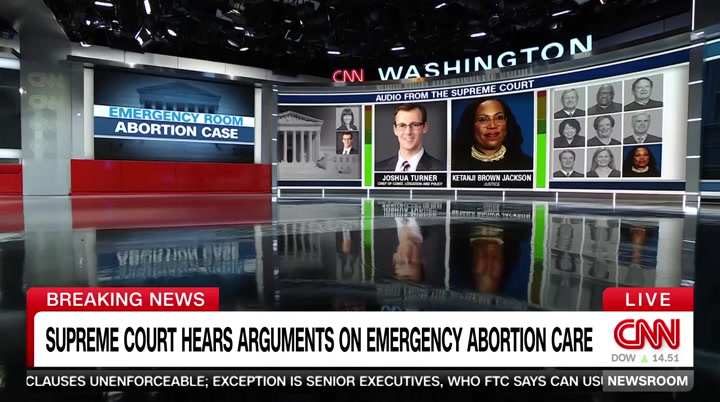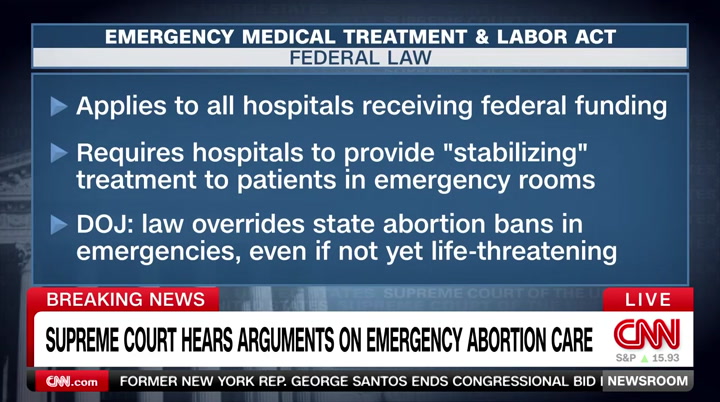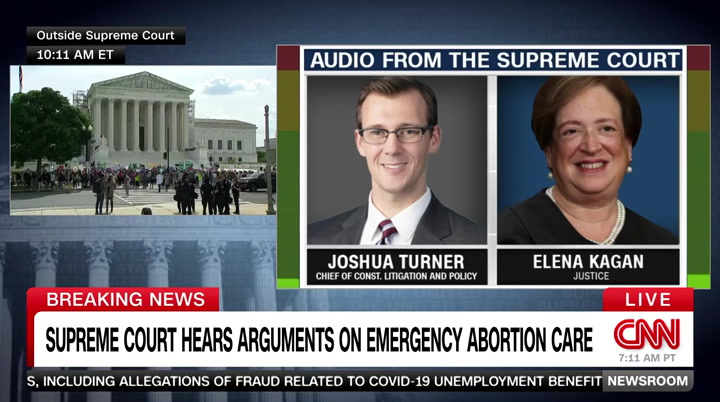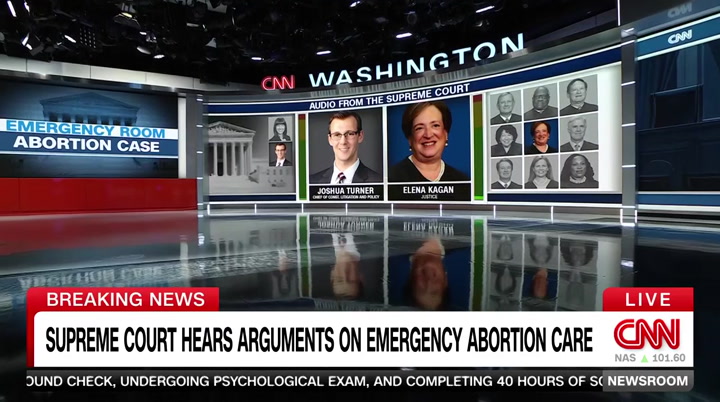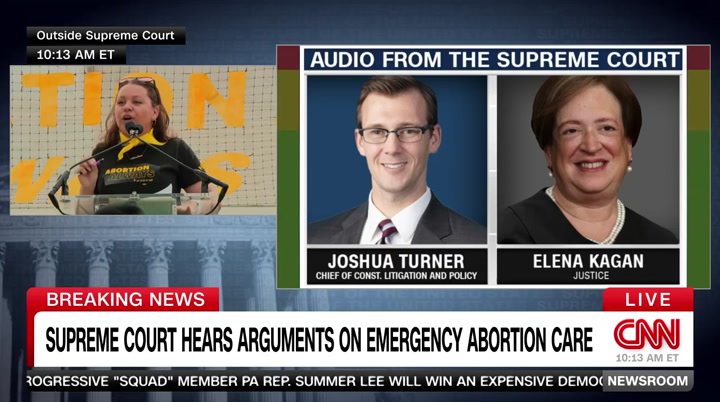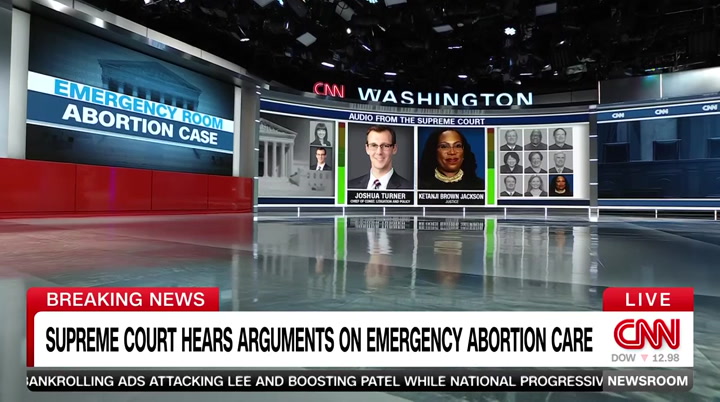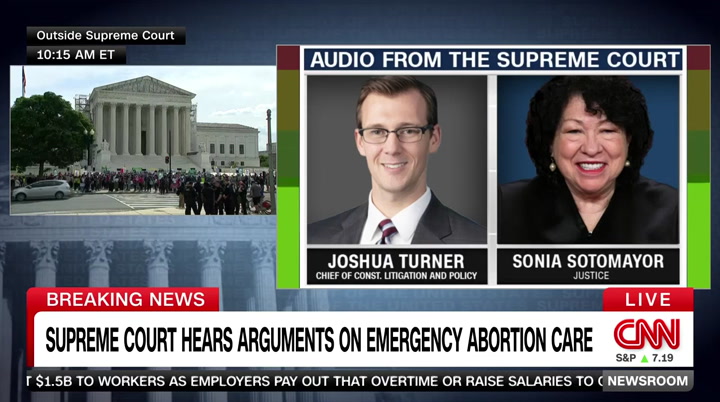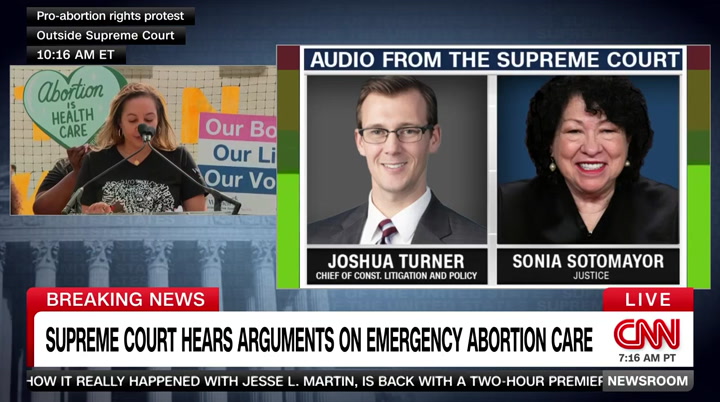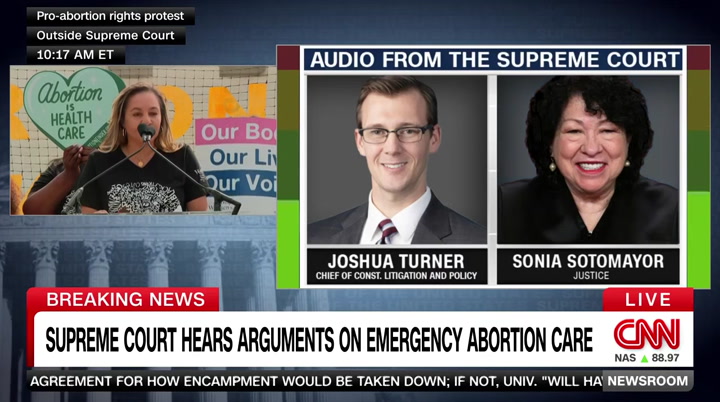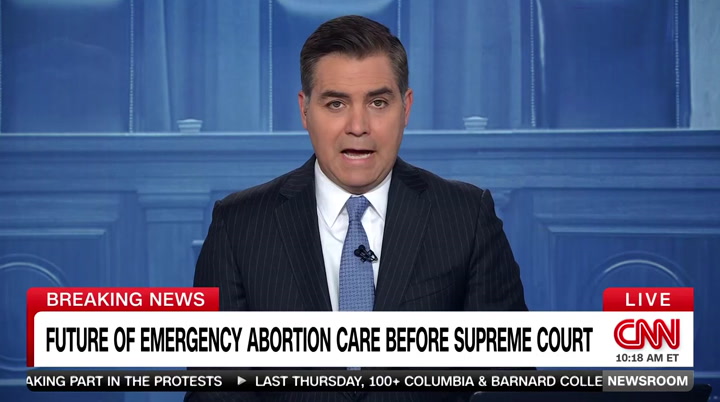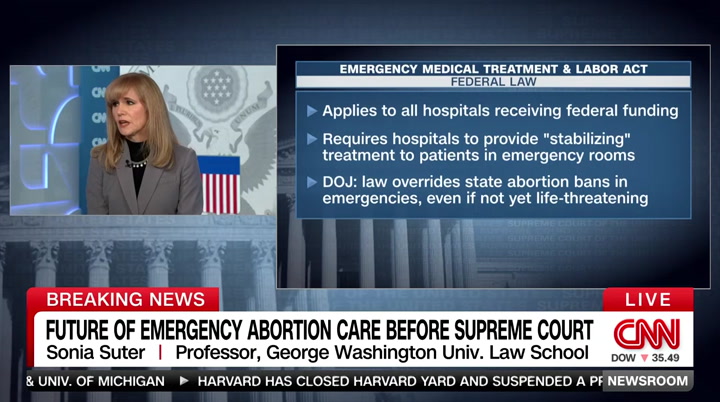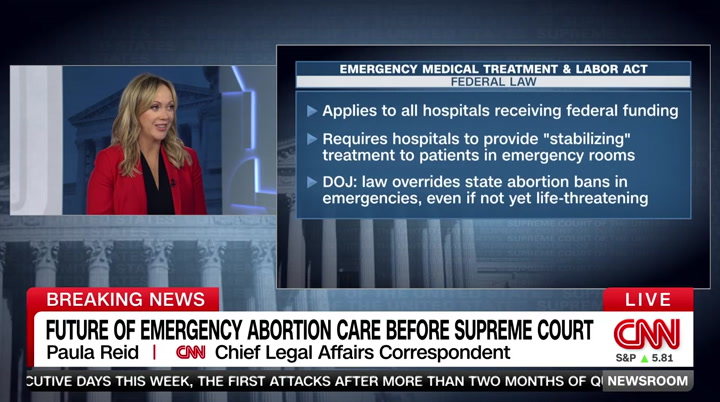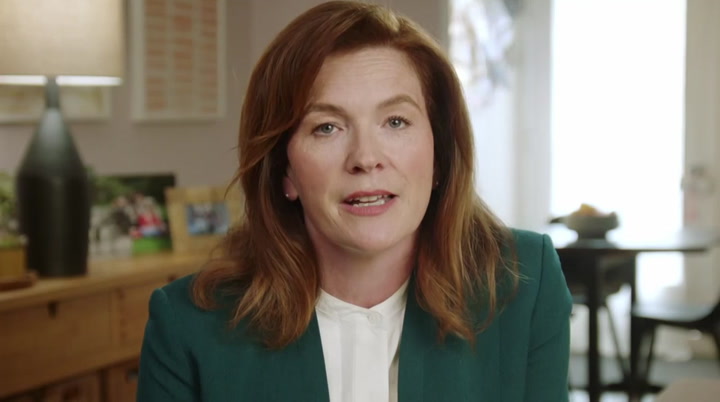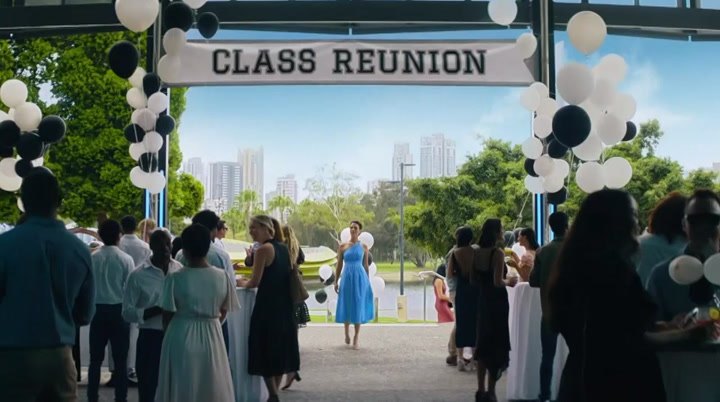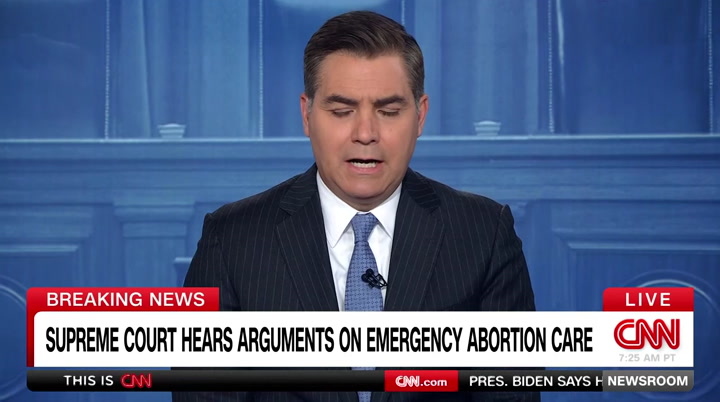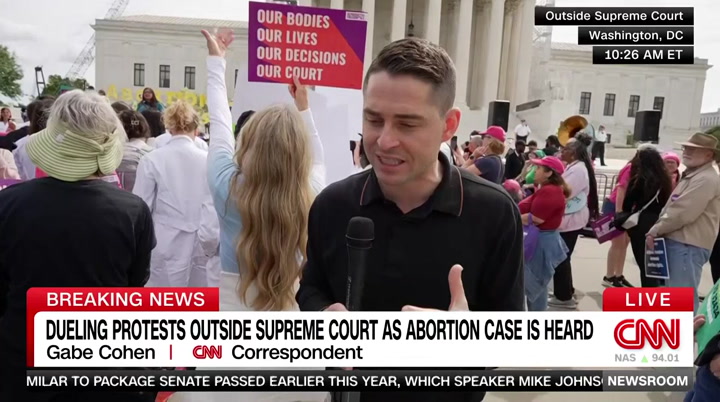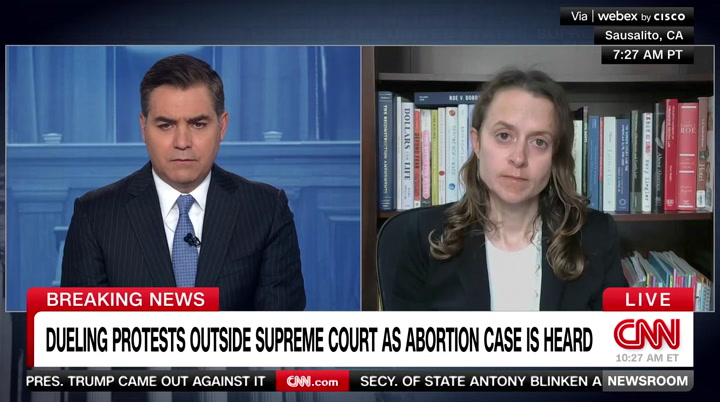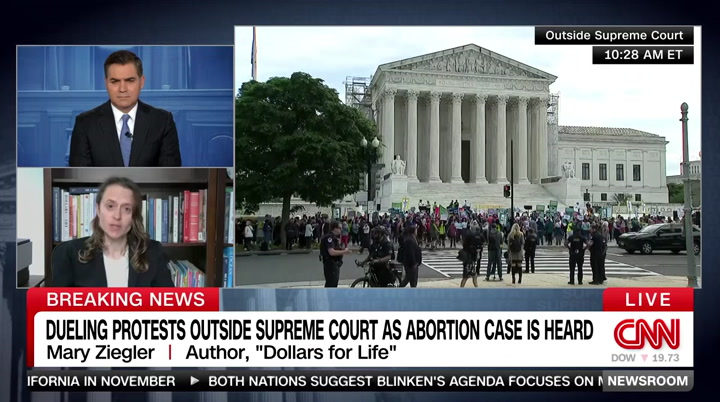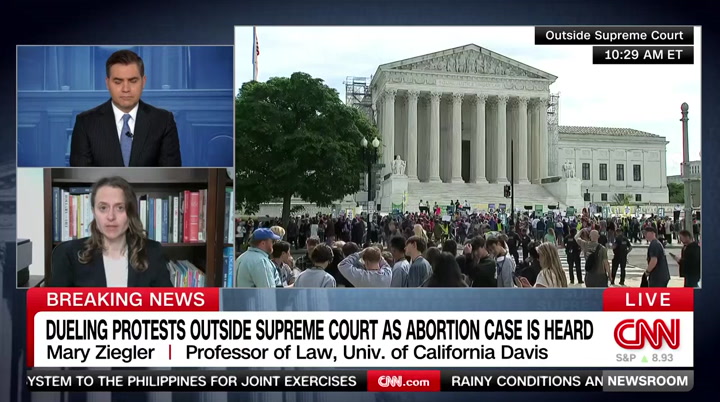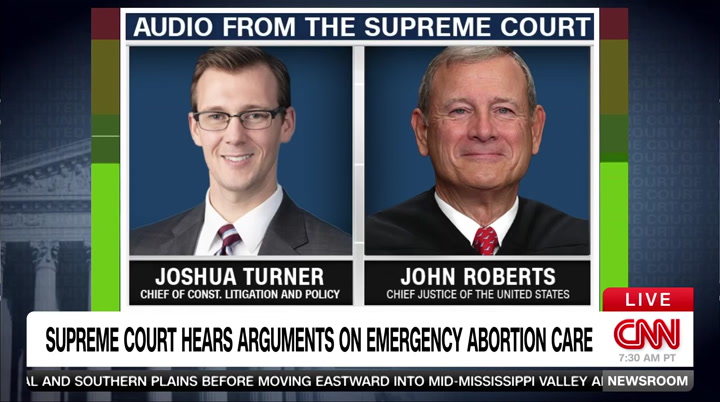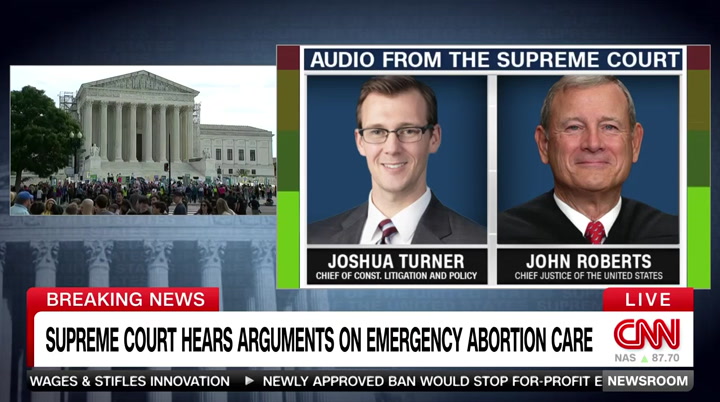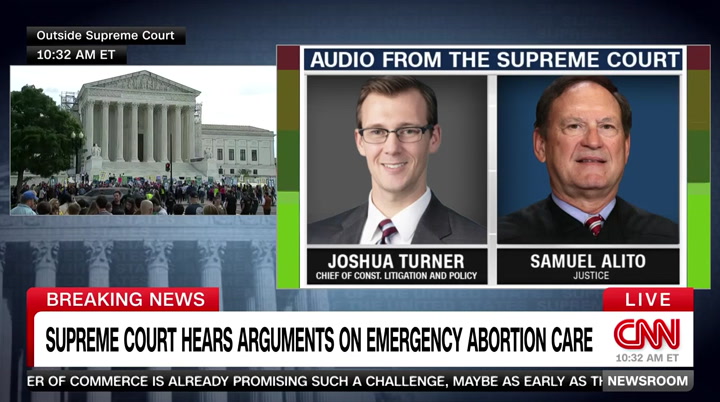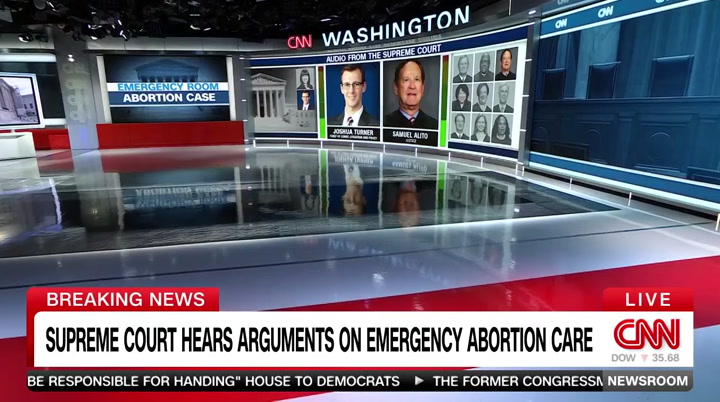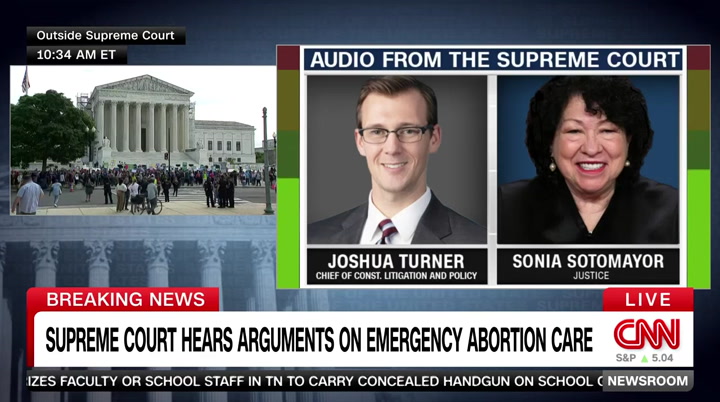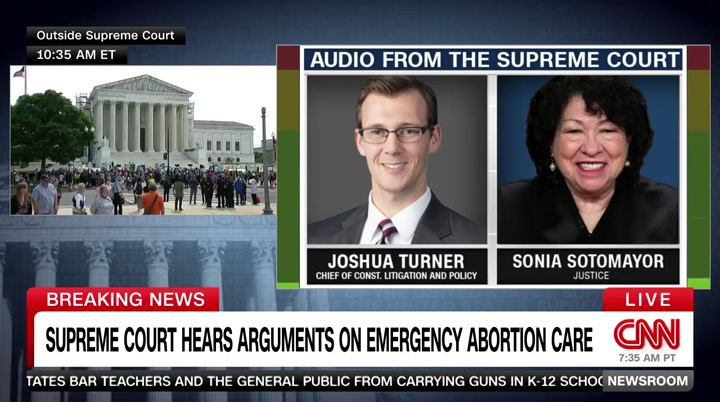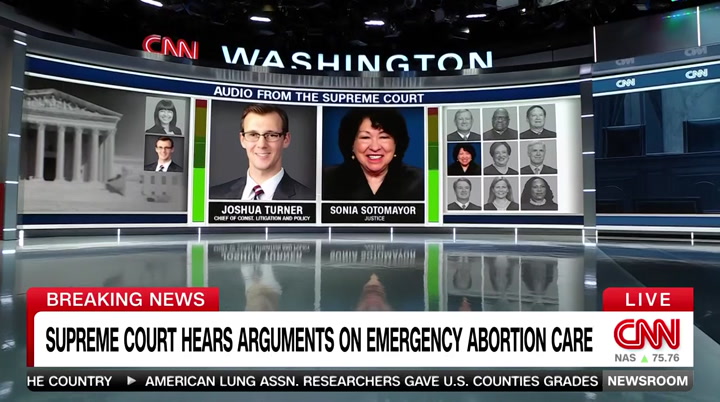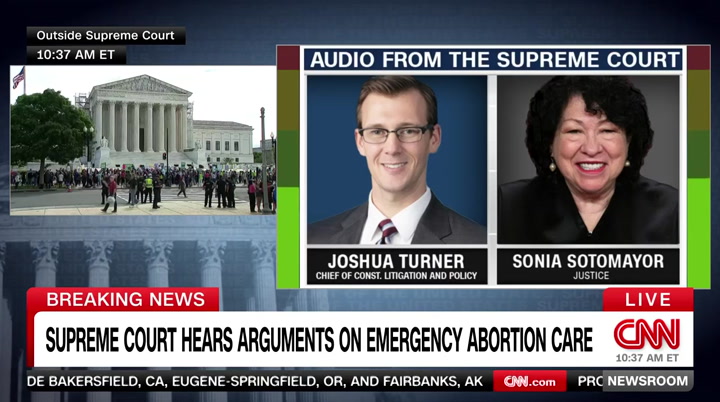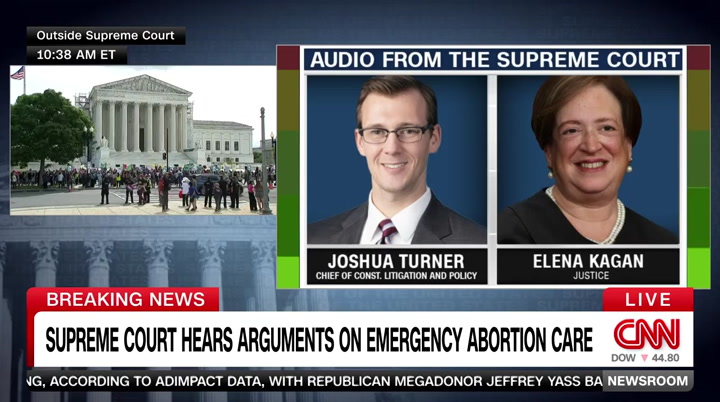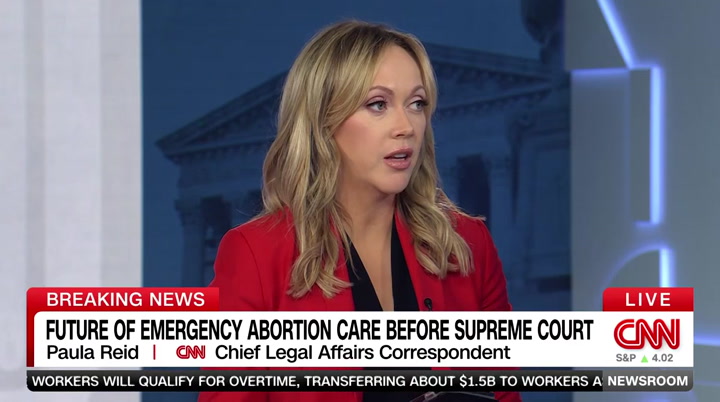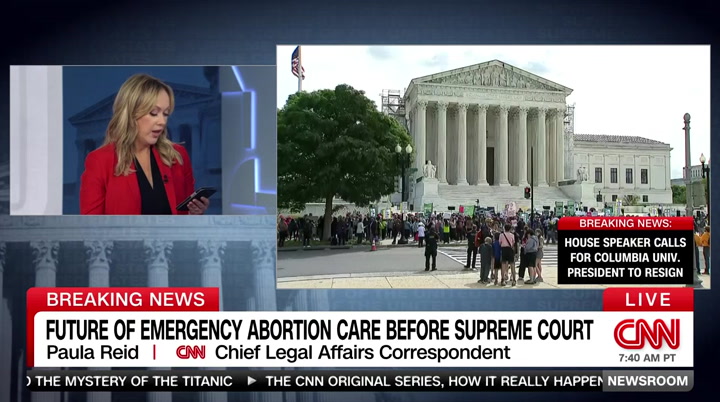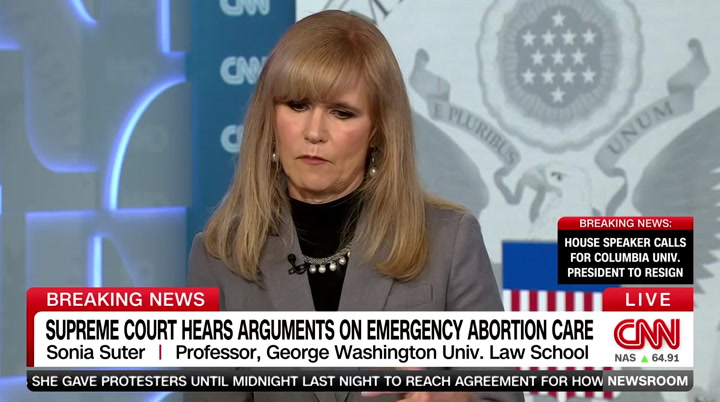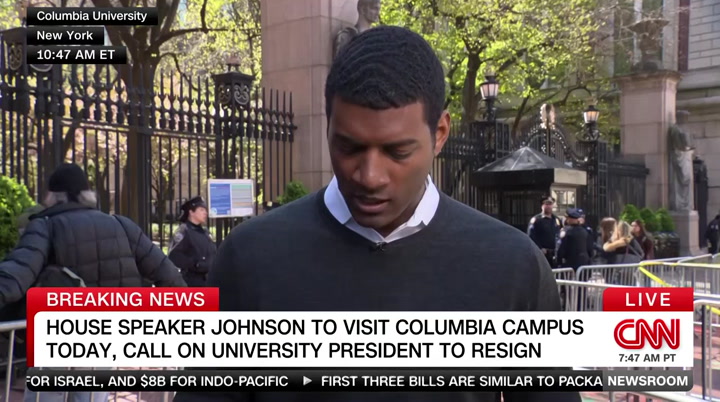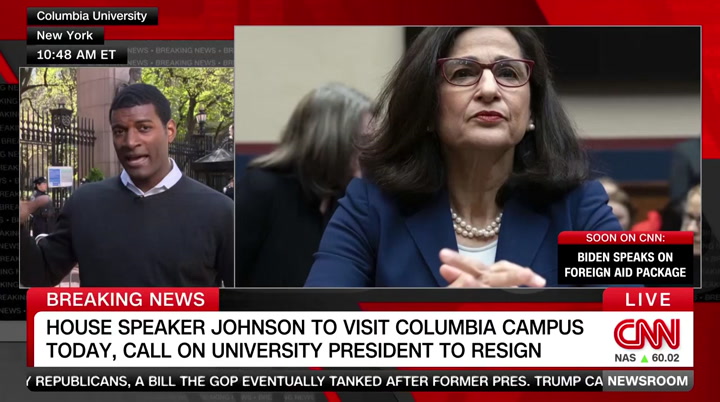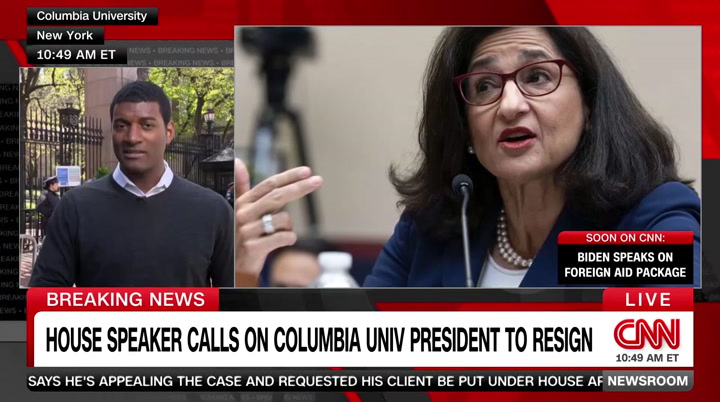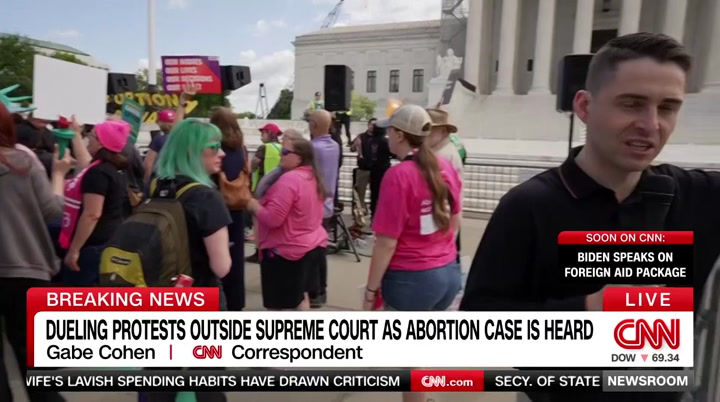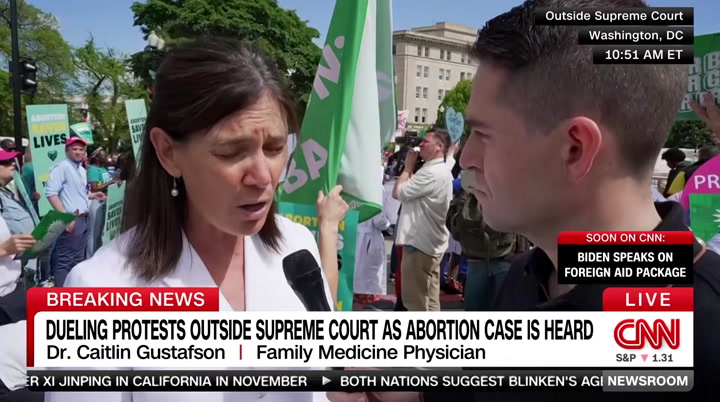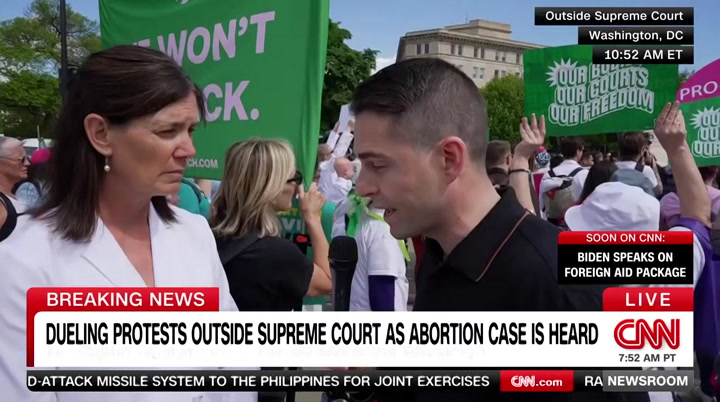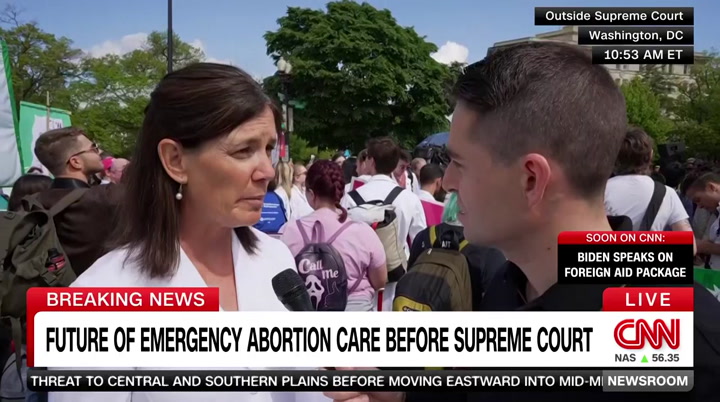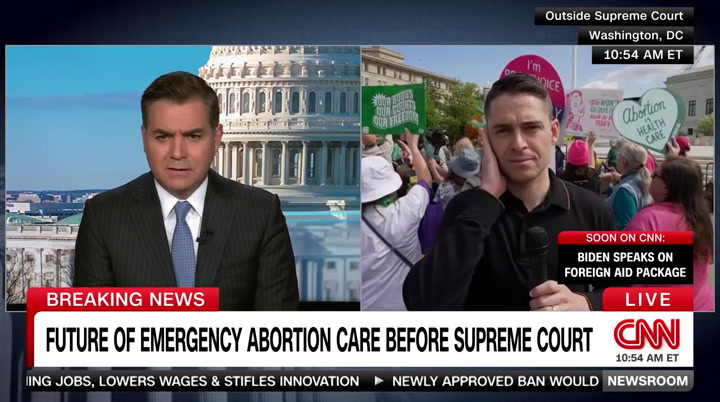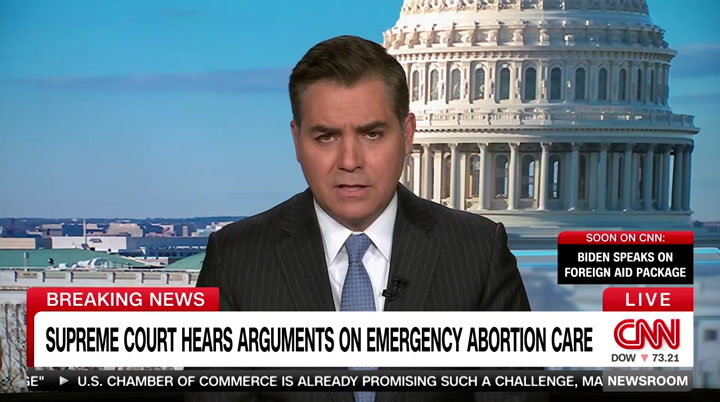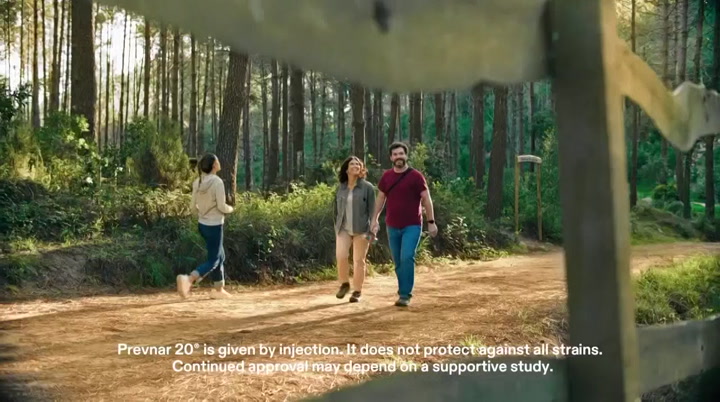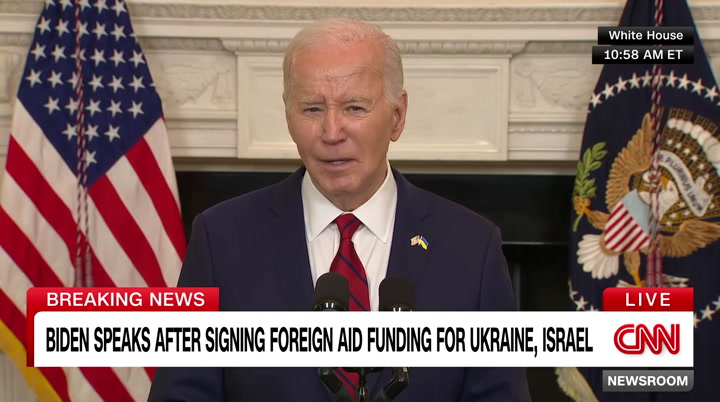tv CNN Newsroom With Jim Acosta CNN April 24, 2024 7:00am-8:00am PDT
7:00 am
has a medical emergency that is not immediately life-threatenin g, the doctors, there don't feel safe to treat them. so you have situations like severe pre-eclampsia or hemorrhaging are premature water breaking. these are situations where if you're to certain stage of pregnancy, you can't deliver that baby if it's too early but you need to save the life of the pregnant person or need to preserve the health of the pregnant person because it can affect future fertility or their organs. it can have all kinds of health consequences where they're not on the brink of death. but that's what doctors are saying is really challenging for their care with this, mother wants to preserve her ability to i have a pregnancy later on and so on. and sania tell talk about this idaho law a little bit. if forbids abortions in a medical emergency it does say you can save the life of the mother, but i mean, we're already seeing in idaho other places where doctors are saying, you know what? i don't want to do practice i want to move my practice to another the state because of this restrictive
7:01 am
ban. >> yeah, absolutely. allows abortions if situations where patients are failing not close enough to say that it's necessary to prevent death. >> and that means that these patients are left in that gap. meghan mentioned. >> and i mean, just ask the obvious question here. this world did not exist before roe was overturned. >> absolutely. right. >> part of the challenges, the meaning of the statute, this federal statute that protects people in emergencies. >> and idaho is trying to say that this is a new problem that the federal government is is creating the rules. but in fact, this has always been the treatment for abortions or sometimes the treatment for these kinds of conditions. it's just that it wasn't banned before. dobbs has changed the landscape. it's not that emtala has changed. it's that emtala plays out differently. now the dobbs allows abortions to be bound with very strict are no
7:02 am
exceptions for health. >> ryan follow dobbs who was supposed to the intent of dobbs of send it back to the states. and that was going be the end of it. states would deal with it and so on. but that has not been the case by a long shot. we i mean, within the last couple of months, we heard the case regarding mifepristone. and this is yet another aspect of the post-roe world that we're all living in now that the justices are going to have to sort through yes. sending it back to the states easier said than done, which is why you're getting all these cases coming back up to the court seeking clarity. >> now, we've seen two of these major abortion cases this year. you mentioned the other one a few weeks ago that was litigated about mifepristone's one of the two drugs commonly used in medication, abortion and these decisions are significant not only because they impact the women who may need these procedures, you need this medication. also quiz it could have an enormous impact on the election historically, we've seen that abortion is an issue that has always galvanized. many were certain block of republican voters. but since the overturn of roe v wade, it's actually something that is really begun to
7:03 am
galvanize democratic voters. these decisions not expected until late june, early july, that's going to be at the peak of the presidential campaign season. so there is much more at stake here, potentially depending on what these decisions end up being, than just the actual decisions themselves. >> and to help our viewers out mega one word we're going to be hearing a lot is emtala. we're going here that a lot during the arguments we need to explain that to our viewers are just a law passed in the 1980s that was supposed to tell emergency rooms that are receiving what federal funding that you cannot deny access. you cannot deny care to people. and one of the based on the research i was doing, i'm one of the cases that i got some media attention back then that led to this law being passed, was a woman with a stillborn so there were cases back then with women with devastating pregnancies who were at issue in all of this? >> yeah. so it's it's the emergency medical treatment and labor act is what emtala stands for. it was enacted in 1986. and if you read some of the coverage of why this went into
7:04 am
place, it's almost sort of mind-boggling because we lived for almost 40 years with this in place, this was put in place after there were a lot of reports of what's known as patient dumping, essentially, a lot of patients, many of whom who didn't have insurance, who were moved before they were even known if they were stabilized from a private hospital? when a public hospital for financial reasons and this could include pregnant women. and if you're in an emergency situation and you haven't been screened and stabilized before the transfer data showed that there were poor outcomes patients even may have died because of this. so this was really an important statute, i think was really interesting is some of the arguments we may here today you hear from idaho is will they didn't call out abortion specifically in emtala and therefore, it's a government overreach. and so we're going to hear like, should everything be called out in emtala, every kind of emergency medical situation, i think it'll be interesting to hear these arguments assignee mean that is i mean, it's another reminder of some of these issues playing out while roe was still the law
7:05 am
of the land and and yet laws like emtala were put into place. how do you expect some of the arguments to play out back-and-forth as we listen to this, because obviously, we're going to hear both sides of this very potent political issue that raises a whole lot of emotions for a lot of folks out yeah. >> i think one big issue is going to be what exactly does emtala requires. so the federal government says it requires the patient's not be dumped if they can't afford to pay, but also the stabilizing care provided a guarantee of emergency medical care. and idaho's seems to be saying in some parts of the brief that it's really just about making sure patients, patients can equal treatment and it's not providing any kind of national standard of care. i think that's gonna be a big part of the debate. it doesn't mention the word abortion, but it also doesn't mention all sorts of other treatments that would be required to stabilize medical care. so rogers, he cares emergency care? exactly. and so you have to in some level, leave it to the health care professional to decide what is the appropriate treatment stabilize a patient and you
7:06 am
can't list everything because there's so many conditions that could arise and paula i mean, not to try to predict what we're going to hear when these justices get going here. >> but it sounds as though where we're going to hear from justices like sam alito and so on, is familiar arguments that we've heard. and actually before i have you answered that question, i apologize. we're gonna go right to the arguments. here's chief justice john roberts. >> it put emtala on a centuries-old foundation, a state law. states have always been responsible for licensing doctors and setting the scope of their professional practice, indeed, and tala works precisely because states regulate the practice of medicine nothing in emtala requires doctors to ignore the scope of their license and offer medical treatments that violate state law. three statutory provisions make this clear. first, section 13, 95, the medicare acts opening provision forbids the federal government from controlling the practice of medicine that's the role of state regulation. second, subdivision, f, in emtala codifies a statutory presumption against preemption
7:07 am
of state medical regulations and third, and tala stabilization provision is limited to available treatments, which depends on the scope of the hospital staffs medical license illegal treatments are not available. treatments at in this court's own presumption against preemption of state regulations. combine that with the need for clear and unambiguous spending clause conditions. and the administration's reading becomes holy untenable the administration's misreading also lacks any limiting principle. >> if er doctors can perform whatever treatment and they determined is appropriate, then doctors can ignore not only state abortion laws, but also state regulations on opioid use and informed consent requirements that turns the presumption against preemption on its head in leaves emergency rooms and regulated under state law. >> it's unsurprising that no court has endorsed such an expansive view of emtala. and until dobbs nor had hhs everyone understands that
7:08 am
licensing laws limit medical practice. that's why a nurse isn't available to perform open-heart surgery. no matter the need no matter hur knowledge? the answer doesn't change just because we're talking about abortion the court should reject the administration's unlimited reading of emtala and reversed the discourse judgment. i welcome the court's questions. >> the normally, when we have a preemption case, there's some relationship between the parties is the state being regulated by the federal government under emtala or is a state and engaged then some sort of kweisi contractual relationship yes, your honor. >> in this case, the state idaho, for example, has no state hospitals that participate with the emergency rooms in emtala. and so in this case, 30 isn't even a clause that relationship the parties being regulated by emtala. here
7:09 am
are hospitals and doctors. i think your question is getting at the armstrong issue and we think that is a significant question. it wasn't part of the question presented. we think the indiana amicus brief raises significant questions and deals with that argument. well but the question presented here is one up direct conflict between idaho's law and emtala. and on that a question, we don't think there's hard at all you're going to that direct conflict. i think if you consider the express limitation within the statue of availability well, before we do that, can i just step back and get your understanding of the statute you made some representations as to how you see it working. and so let me tell you what i think and then you can tell me whether you agree, disagree, or otherwise so i think that there are two things that are clean, pretty plain on the face of this statute. one is that emtala is about the provision of
7:10 am
stabilizing care for people who are experiencing emergency medical conditions. and one thing i think the statute is doing. i also think that it is operating to displace the prerogatives of hospitals or states, or whomever with respect to that fairly narrow slice of the health universe, this idea of emergency medical services is like one very minor part or small part of the overall health care provision of health care. so what that means is that when a hospital once to only provide stabilizing care in emergencies for people who can pay for it. for example emtala says, no, i'm sorry, you have to stabilize anyone who's experiencing an emergency medical condition or when a hospital wants to provide stabilizing treatments to people who are are experiencing only certain kinds of emergency conditions. and tala says, no, here's the list of conditions and you have to provide
7:11 am
stabilizing care for those people similarly, if the state says, look, it's our job to govern all of healthcare in our state and we say that only certain kinds of health care can be given to people who are experienced thank emergency medical conditions. we don't want whatever treatment we want only certain kinds of treatment and says, no. >> we are directing that as a matter of federal law, when someone presents with an emergency condition, they have to be assessed and the hospital must do what is ever is in its capacity to stabilize them. >> is that your understanding of the statue partially, your honore, we agree that emtala does impose a federal stabilization requirement, but the question here is, what is the content of that stabilization requirement for that? >> you have to reference state law. okay. well what you just said is important because when you concede that emtala imposes a stabilization requirement, it
7:12 am
is this statute, the federal government interfering, if you will, in a state's health care choices. >> so emtala is on its face, a statute that says it's not all the states way. there are federal requirements here. there is a requirement to stabilize emergency patients and you agree with that? >> yeah. justice kagan, we agree that and house purpose was narrowed to bridge this gap that existed in some. okay. so we can just take off the table this idea that just because it's a state and the healthcare the federal government has nothing to say about it. the federal government has plenty to say about it in this statue. now, you're right. now. there's a question of what's the content of this stabilization requirement and as far as i understood your opening remarks, you say, well this is left to the states but if i'm just looking at the statute, the statute tells you what the
7:13 am
content of the stabilization requirement is. it's to provide such medical treatment it may be necessary sorry, to assure within reasonable probability that no material deterioration of the condition is likely to occur if the person were transferred or didn't get care. so it tells you very clearly it's an objective standard it's basically it's a standard that clearly has referenced to accepted medical practice, not just whatever one doctor happens to think, but it's here the treatment necessary to assure within reasonable medical probability that no material deterioration occurs let me respond in two ways. >> first, the objective standard that you set forth, baer and that understanding thank is contrary to the administration's view. they see it as a totally subjective standard and whatever treatment
7:14 am
a doctor determines as propriate. >> but that's t true. i mean, i think u guys can argue about this yourself, but as i understand, the solicitor general's brief, and we'll see what the solicitor general says. but the solicitor general's as it's not up to every individual doctor, this is a standard that is objective, tt incorporates acpted medical standards of care. >>ell, in the re fundamental point is the definition that you quoted have care in the operative position provision in b1 is also texturally explicitly qualified by that which is within the staff and facilities available at rate that's what facilities available at the hospital and if you just look at that language, i mean, it's absolutely clear that that's not a reference to what state law involves the staff and facilities available if you don't have staff available to provide the medical care, then i guess you can't provide the medical care if you don't have the facilities available to provide the medical care, then you can't provide the medical care at transfer has to take
7:15 am
place for the good of the patient. >> this is a really important, is this the availability here? >> because it's the availability of staff and facilities? it's do you have the right doctors? do you have enough doctors? do you have the right facilities or is it better for the patient to transfer them to the hospital? a few miles away, you're exactly right. >> do you have the right doctors? how do you answer that question, except by reference to state licensing law, but you absolutely can't do that. i mean, that's the the point that i was trying to make, which is that the federal mandate is to provide stabilizing care for emergency conditions regardless of any other directive that the state has or the hospital has that would prevent that care from being provided. that's that's the war work of the statute. >> justice jackson. that's not even hhs is conclusion in the state operations manual, which they proffered on page 36 of the brief it defines what makes a staff person available under
7:16 am
the statute and they say it has to it doesn't say that they're not available of state law, doesn't doesn't allow this procedure. it says they are available to the extent they are operating within the scope of their medical license. and that is our argument. they want to now draw it far more narrow and look only at physical availability. we agree that's the component, but there's also a legal availability component here. >> so the problem we're having right now is that you're sort of putting preemption on its head the whole purpose of preemption is to say that if the state passes a law that violates federal law, the state law is no longer effective. so there is no state licensing law that would permit you permit the state to say don't treat diabetics with insulin treat them only with pills. metaphor, and a doctor looks at a juvenile diabetic and says, without insulin, they're going to get seriously ill. and the
7:17 am
likelihood. >> and i don't know what that means under idaho law, we'll get to that shortly. because i don't know this. >> we believe this is a better treatment federal law would say, you can't do that medically accepted, objective, medically success. that standards of care require the treatment of diabetics with insulin the medically accepted obligation of doctors when they put have women with certain conditions that may not result in death but more than likely will result in very serious medical conditions, including blindness or some for others, the loss of organs for some chronic blood strokes idaho is saying, unless the doctor can say in good faith that this
7:18 am
person's death is likely as opposed to serious illness. they can't perform the abortion so i don't know your argument about state licensing law because this is what this law does. it tells states your licensing laws can take out objective middle medical conditions that could save a person from serious injury or death yeah i think there are two crucial responses to your point and let me begin with the preemption point subdivision af and section 13, 95. i've actually are telling hhs the federal government and courts just the opposite that you know, it's saying, you can preempt unless there's a direct conflict if objective medical care requires you to treat women who are who present the potential of serious medical
7:19 am
complications and the abortion is the only thing that can print evident that you have to do it idaho law says the doctor has to determine not that there's merely a serious medical condition but that the person will die yeah, that's a huge difference. all right. you've been listening to a court arguments over the very strict idaho abortion ban and how it pertains to emergency abortion care and whether or not that is allowed in the state of idaho obviously has national implications back with me to talk about this. >> paula reid and sonya suitor, a professor at george washington university school of law. sunday. sunday. let me go to you first and get your perspective on what we heard so far. we heard some of the liberal justices on the high court sort of pounce on this. and we heard elena kagan's saying, well, the emtala law says you're supposed to provide emergency care if you're receiving federal funding and some of these emergencies abortion services are going to have to be performed. what's going on
7:20 am
here? i mean, she seems to be pretty aggressive questioning from all of the liberal justices on this. >> yeah, i think they're they're basically saying that the statute seems pretty clear that you have to stabilize care and it really doesn't matter and with the state law is as kagan said, this is really a law that allows the federal government to say something about the kind of care that can be provided and the response is, well, it depends on what the state law is, but there's there's a section that talks about the availability of resources at the facilities and the more than liberal justices seemed to say, no, that's just about what the facilities offers. state law isn't what's at issue here because emtala allows the federal government to preempt state law, and it wouldn't make any sense to have that preemption language if you said it doesn't matter, you have to do at state law requires yeah. >> i mean, paul, i mean, that's one of the issues here. is that i guess the folks who were arguing the idaho's sayyed of this are saying, well, this is federal overreach and the liberal justices like elena kagan are saying, well, i'm
7:21 am
tala has been in place since the mid 1980s. there were already federal restrictions all these years. yeah, that's the way the law has been working. >> exactly josh turner making his debut before the supreme court. and in moments there, it showed that this was his first time arguing before the justices liberals, maybe the minority on the court, they were clearly the majority of questions and they were not buying what he was selling. and you heard there just to set up my or she was really focusing on the potential human cost. >> right. if you agree with his interpretation, which clearly she does not, and he responded to that. he didn't really so even acknowledged the question that she was asking. instead, he just pointed to a subsection of the us code. so this does not appear to be going well for him so far. but again, we've only really aside from justice clarence thomas predominantly heard from the liberal justices all right, thanks to all of you. we're going to continue to monitor the supreme court arguments on emergency abortion care has a potential to really change the landscape. but depending on how the high court ways we're going to take a quick break. we'll be right back every piece, of evidence
7:22 am
tells a story how would really happy with jesse l. martin sunday at nine on cnn imagine a future where plastic is not wasted. but instead remade over and over into the things that keep our food fresher our families safer, and our planet cleaner to help us get there america's plastic makers are investing billions of dollars to create innovative products and new recycling technologies for sustainable change. >> because when you push for smarter solutions, week things can the riva support your brain health? >> married janet, hey, eddie, know fraser, franck. frank bred. how are you?
7:23 am
>> fred, fuel up to seven brain health indicators, including your memory, joined the neretva brain health challenge why always the couch doesn't need to get a puppy school. get his little puppet diploma no much ever been spending all this little. can when your questions about life turned into questions about money. >> there's erica the virtual financial assistant to help you spend save, and plan smarter only from bank of america what would you like the power to do? with this? let's romantics welcome. >> i'm your host checkup i wish whether getting up here fine, but february we're just gonna go up to bad and, we believe it goes mother is buried in the meanwhile at a vrbo when other vacation rentals have no privacy, ter
7:24 am
one that has no one, but you how far would you go? is that the ambiance of your space? try the air wigwe with air wake essential missed infused with natural essential oils to fill your low bit with immersive fragrance for up to 45 days now that's a breath of fresh air whack. >> my name is susie loftus, and i'm the head of trust and safety for us data security, tiktok i'm a former prosecutor and it's my job to keep american tiktok users safe. >> big part of that is making sure that their data is protected. >> we're spending $2 to make sure that we're keeping tiktok safe. we have a us led team. we have a third party in american company to store protected user data. i've dedicated my life and my career to building safety and it's my job to build it on tiktok here. you can expect to find crystal clear a audie expansive, display space
7:25 am
and more comfort for every one but we still left room for all the unexpected things. we'll find out here. the new 2024 grand cherokee lined there's only one during the jeep celebration event kit, the 2024 jeep grand cherokee, starting at 38,000 to 90 msrp visit cheap.com for details if you're living with moderate to severe plaque psoriasis for active psoriatic arthritis symptoms can sometimes dq out of the moment now, they're sky rosie so you can show off with clearer skin and show it off with, sky rizzi. you could take each step with 90% clearer skin. and if you have psoriatic arthritis, sky rosie can help me get moving with less joint pain, stiffness, swelling, and fatigue and sky rizzi is just four doses a year after to starter doses serious allergic reactions and an increased risk of infection or a lower ability
7:26 am
to fight them may occur. tell your doctor if you have an infection or symptoms had a vaccine or planned too. >> thanks this guy rizzi, there's nothing. clearer skin and joint pain and that means everything your doctor about how sky was e to help with your skin or joint symptoms, warn now api can help you save harbor sola alvarez at the white house. and this is cnn welcome back to our continuing coverage of the supreme court arguments over the restrictive idaho's abortion ban. >> cnn's gabe cohen is outside the supreme court for us. gabe my understanding it's it's been getting lively out there. what can you tell us a look, jim, we are listening to two dueling protests that are unfolding at the same time right behind us over there. >> that is an anti-abortion a group of activists having their program what we're hearing over there are a lot of talk about federal government overreach, talking about how
7:27 am
abortion is never the answer and basically saying states like idaho should be able to control their own destiny when it comes to the issue of abortion what's happening behind me here, these are abortion rights activists, a much larger crowd having their own program and they yet what we're constantly hearing is abortion is health care and that states like idaho are preventing pregnant people from getting the abortion care they need it during medical emergencies. this stabilizing care talked about in this federal law, emtala basically saying that the delays are potentially extremely dangerous for pregnant people. and look, we have already seen jim tension, intense moments between the protesters from both sides. we had seen a couple anti-abortion activists come over here. there was a bit of a clash. a lot of chanting and yelling back and forth between them. and some of the abortion rights groups that are here. and so we're going to continue to watch these programs unfold, but the crowd in the meantime, has been
7:28 am
growing as the arguments are happening inside the supreme court. a lot of discussion about what it means for so many americans happening right outside e game. >> keep us posted on all of that. thank you very muc i want to go now to marry ziegler. she's a professor of law at the university of california davis, mary thanking you so much for being with us. what are your thoughts on the arguments that we've heard thus far? and if there is a ruling, ultimately by the supreme court that protects emtala across the country. the state law that says if hospitals are receiving federal funding, you have to provide a medical emergency medical care in that includes abortions as well. might that re-establish some abortion protections nationwide? what are your thoughts? >> well, i think it's really hard to get a read on what's happening so far because of course we know the supreme court has a conservative supermajority and we've heard almost nothing from any of the conservative justices, right? so i don't know if that's because they're agreeing with
7:29 am
their liberal colleagues or if they're just holding their fire and waiting until blizzard, or general elizabeth prelogar is going to take her turn in terms of what would happen if the government is to win in this case, that two is complicated. we had reporting from the associated press just last week suggesting that even now, when there was prior to the court getting involved, a threat of fines and other penalties under emtala for hospitals that a lot of hospitals were still turning away. pregnant patients, even pregnant patients, not seeking abortions because they were afraid of state criminal penalties in part because those fines were delayed in part because it was sometimes difficult for the federal government to actually implement those penalties. so it would certainly provide some kind of baseline for patients seeking emergency treatment, whether it would be enough because doctors are so afraid of criminal law. i think is still kind of ambiguous and mary, i mean, just to get our viewers up to speed on this, if not paying close attention to this aspect of the post-dobbs
7:30 am
world that we're living in my understanding is an idaho and other states, there are real life scenarios already emerging where women are going in, they're seeking emergency medical care because of a complication with their pregnancy and because of whatever state they live in, there, in some cases being told they cannot receive that care that's absolutely right. so we're seeing some scenarios where hospitals are not wanting to treat pregnant patients because they're afraid of human coming close to violating the law and we're also seeing i think it's worth emphasizing not only patients seeking abortion, but patients with wanted pregnancies are experiencing miscarriage or stillbirth who are also being turned away because positions are not exactly sure when their conduct is going to be deemed to violate the law by a prosecutor and laws like idaho's have pretty steep penalties for physicians, right? >> we're talking about at least several years in prison, loss of a medical license, things that would be essentially career ending for
7:31 am
doctors. and we're seeing many physicians are under to take those all right. >> mary, i've got to jump in because amy coney barrett, one of the conservative justices on the supreme court is speaking now, let's go to that life. >> made clear that there is no medical certainty requirement. you do not have to wait for the mother to be facing death council iq. counsel is there what happens if a dispute arises with respect to whether or not the doctor was within the confines of idaho law or was it? >> it's the dr. subjected to review by a medical authority exactly how is that evaluated? because it's an obvious concern if you have an individual exception for a doctor and they were having a debate about is that covered by your submission? that nothing in idaho law prohibits playing with emtala who who makes the decision whether or not something's within or without so i mean, i imagine there are
7:32 am
two ways the law can be enforced, or at least to the board of medicine has a licensing oversight over a doctor and idaho's supreme court made clear that that doctors and medical judgment is not going to be judged based on an objective standard. >> what a reasonable doctor would do. that's not the standard the second way would be if it was what is the standard? the doctors good faith medical judgment which is subjective, and that's not subject to review by any medical board. if there's a complaint against the doctor that his standards don't comply with sees the only doctor at the particular emergency room and he has his own particular standard. >> what the idaho's supreme court has said is that you may consider another doctor's opinion only on the question of was it a pretextual medical judgment not a good faith one. >> justice thomas justice alito well, i would think that the concept of good faith medical judgment must take into account some objective standards, but
7:33 am
it would leave a certain amount of leeway for an individual doctor. >> that was how i interpreted with what the state supreme court said. now you have been presented here today with very quick summaries of cases and asked to provide a snap judgment, about what would be appropriate in those particular cases. and honestly, i think you've hardly been given an opportunity to answer some of the hypotheticals, but would you agree with for me that if a medical doctor who is an expert in this field, were asked bang, bang, bang, what would you do in these particular circumstances, which i am now going to enumerate, the doctor would say way, i don't this is not how i practice medicine. i need to know a lot more about the individual case. would you? three with that? >> absolutely. and acog has in the case of prom, for example,
7:34 am
acog doesn't just knee jerk, say an abortion is the standard of care acog itself says that expectant management is oftentimes the appropriate standard of care. and so these are difficult questions that turn on the facts that are on the ground between the doctor as he is assessing them with his medical judgment that he's bringing to bear, but is also necessarily constrained by idaho law. just like every other area of the practices some medicine, state law confines dr. judgment in some ways thank you. justice sotomayor, there is a difference between stabilizing a person who presents a serious medical condition requiring stabilization then a person who presents with a condition quoting idaho's words where there is a poses a great risk
7:35 am
of death to the pregnant women. you agree their stay light between the we agree and i think this instance, there will be some women who present serious medical condition that federal law would require to be treated who will not be treated under idaho law? no, i disagree with that idaho hospitals are treating these women. they're not treating these women with abortions necessarily, your honor and that's just the point which is they will present with a serious medical condition that doctors and good faith can't say will present death, but will present potential loss of life those dr. potential loss of an organ or serious medical complications for the woman, they can't perform those operations. >> your honor, if that hypothetical exists, and i don't know of a condition that is so certain to result in the loss of an organ, but also
7:36 am
certain not to transpire with death if that condition exists? yes. idaho law does say that abortions in that case aren't allowed. and i think that let me stop you there. >> because all of your legal theories rely on us holding that federal law doesn't require, cannot preempt state law on the these issues. and so when i asked you the question if a state defines likelihood of death more stringently than idaho does? you would say there's no federal law that would prohibit them from doing that. >> well, i would say that emtala does not contain a standard of so there's no no standard of care in your briefing, you made these sgas position here and you almost argue that now that that their position that federal law requires stabilizing treatment
7:37 am
and not equal treatment of patients which was a position you took in your brief. you seem to have backed off from it here. you seem to agree that federal law requires some stabilizing condition, whether or not you provided to other patients but i have countless briefs that say that both that hhs has filed that pre-dobbs pre 2009. this is not an unprecedented position that hhs in countless situations cited hospitals for discharging patients who required an abortion as a stabilizing treatment congress discuss that topic in the affordable care act and explicitly said that nothing in the affordable care act shall be construed to relieve any healthcare provider from providing emergency services as required by state or federal law? medical
7:38 am
providers have told us that for decades they have understood both federal law and state law to require abortions of stabilizing conditions people presenting serious medical risk lower courts, there's at least cases of lower court saying you have to provide abortion. so this is not a post-dobbs unprecedented position by the government it absolutely is the footnote to the administration sites to two spreadsheets that contain 115,000 rows of enforcement instances the administration has identified a single instance so pre-dobbs, this wasn't much of a question, but there is hhs guidance and there's at least three cases in which it was invoked. >> the fact that we didn't have to hhs didn't have to do it much be before pre-dobbs doesn't make their position.
7:39 am
my point my point is more fundamental, your honore, it's not just that there are few instances. there are no instances, and not just on the issue of abortion, on any instance where hhs has come in and total hospital, you have to provide a treatment that is contrary to state law. and this isn't just about abortion. consider are now back to that. okay. thank you. this is kagan mr. turner, practicing medicine as hard, but there are standards of care, aren't there? yes, there are. >> and one of those standards of care with respect to abortion is that in certain tragic circumstances? as you yourself, as your own state's law acknowledges where a woman's life is in parallel and abortion is the appropriate standard of care, isn't that right? >> that's right. >> and emtala goes further. it says that the appropriate standard of care and you've been listening to what supreme court arguments over the restrictive idaho abortion ban some of the justices going back-and-forth there. you could hear elana kagan sort of going
7:40 am
after joshua turner, who was the attorney representing the state of idaho and all of this. let me go back to paula reid sagnol suitor, who are seated with me here in the studio paul, your your assessment of what we've been hearing so far? we did here, sam alito, a little while ago, one of the conservative justices sort of poking holes and some of the arguments that is liberal counterparts were making, but you hurdle into kagan, they're just a few moments ago. i mean, getting rather pointed. i think with joshua turner. yeah. and that's after justice sotomayor decided she just was sort of done. it was clear. she's frustrated. i look, this is turner's first time arguing in front of the justices, and i think it's it's showing especially for example and what we're justice sotomayor, she has diabetes and she shared a hypothetical about someone with diabetes, the type of care that they could be prevented from receiving she gave a hypothetical and he he had a moment there. we could have maybe acknowledged the humanity there. so maybe he just moved on to his legal arguments. so that was not wanting him any friends with the liberal bloc. but one of the things that we weren't able we'll do here on air, but our colleagues are following this. i'm gonna read it. >> it's the questioning from
7:41 am
justice amy coney barrett, and it's interesting because she pushed the idaho attorney joshua turner over when doctors could be criminally prosecuted for performing an abortion under state law. >> and she's making an interesting point here, because really it was the liberals who dominated most of turner's arguments their questioning. but she asked him whether if a doctor reached the conclusion in good faith that an abortion was medically necessary, but prosecutors disagreed. could they be prosecuted under idaho law? right. what is the prosecutor thought and i'm quoting her now. well, i don't think any good faith doctor would draw that conclusion. i'm going to put on my expert turner responded saying that you're honor, is the nature of prosecutorial discretion, and it may result in a case. i think he might have missed the point she was trying to make. she's raising concerns that if they agree with his side, your doctor's could potentially be prosecuted at the discretion of lawyers and he didn't defend his position very well. >> yeah. and sana, you wanted to make a point? pointing to about how i mean, in a lot of these cases when these
7:42 am
emergencies arise and people arrive at the emergency room the fetus is not going to survive, right at this one, we're talking about preserving the health and the life of the mother exactly when these situations arise, where the standard of care would be determined? nathan these are usually pre viability. there's usually no chance for the fetus to survive and it's a question of whether the mother is going to be brought to the brink of death, or whether we protect vital organs and health and avoid more seed loss of fertility and other outcomes like that. so i think that's sort of idea that idaho presents that you can save both the mother and the fetus is really mistaken, i think this case just points out that pregnancy can be dangerous, and many of these cases are not people who wanted to their pregnancy. many of these cases are people who wanted to be pregnant and complications arose lots of complications in her eyes and pregnancies as we all know, it happens. >> all right thank you both really appreciate those discuss discussion points and we're gonna have more on all of this in just a few moment. stay with
7:43 am
us. >> we'll get back the white house correspondents dinner lives saturday at seven eastern khan, cnn that smell could be 8 million odor causing bacteria. good thing adding lysol laundry sanitizer, kills 99.9% of bacteria that detergents leave behind. clean his good santa the ties is better can the riva support your brain health? mary janet, hey eddie, know, fraser, franck. frank bred. how are you fred, fuel up to seven brain health indicators, including your memory, joined the neretva brain health challenge sometimes the lows of bipolar depression feel darkest before dawn. >> with kept lighter, there's a chance to let in the light kept lighter is proven to deliver significant relief across bipolar depression unlike san medicine it's the only treat bipolar one gets lighter traits both bipolar one
7:44 am
and two. depression. and in clinical trials, movement disorders in weight gain, we're not common. >> call your doctor about sudden mood changes. behaviors, or suicidal thoughts antidepressants be increased these risks and young adults, elderly dementia patients have increased risk of death or stroke. report fever, confusion, stiff or uncontrollable muscle movements which may be life-threatening or permanent. these aren't all the serious side effects capsulated can help you let in the light, ask your doctor about kept lighter, find savings and support? i kept blight a.com we are in a limestone cave letting extreme residue build up to put finished jet dry to the test dishwashers are designed to object, right? >> to defend against top residues. for are practically spotlight, shine i could see why you're expanding. it's nuts online to what's the secret? >> we know humans like new toys. >> so always staying one step ahead with ai, we can look at so much more than sales data by our behaviors social engagement
7:45 am
see that predictive analytics, how long have you been doing this? >> as long as we've been with vdo people who know no bbdo so this has pickleball with e-trade for morgan stanley. >> we're ready for whatever gets served up. >> didn't get willing to trust him. >> i'd rather work on saving for retirement poole college since you'd like to get schooled has premium burned, right how far would you go? >> is that the ambiance of your space? try the air wigwe with airway essential missed, infused with natural essential oils to fill your login with immersive fragrance for up to 45 days now that's a breath of fresh air whack. >> i love your dress. >> thanks i splurged a little because liberty mutual customize my car insurance and i saved hundreds. that's great. >> i know. right. i've been telling everyone did you hear that type just set her first word can you say mama? never
7:46 am
7:47 am
3636 called now, i'm natasha bertrand at the pentagon and this is cnn all right, some breaking news to tell you about how speaker mike johnson says he will call on columbia university's president to resign. >> johnson is set to go to columbia later today to meet with jewish students. this comes as pro-palestinian protests at the university have entered their eighth day. as students are occupying the west lawn on campus, cnn's omar jimenez, is there a o'mara, you've been covering this for days now. tensions have been
7:48 am
mounting. of course. and now the house speaker is going away. and what more can you tell us? >> yes. so of course the big question or what was what was the house speaker going to say as he met with jewish students here on campus as you just mentioned, as we learned, he does plan to call for the resignation of columbia university president minouche shafik, saying on a radio show this morning, quote that shafik has shown to be a very weak leader. and then going on to talk about the wider climate of process that we've seen, not just a columbia, but at universities across the country calling it maddening what we're seeing on these college campuses across the country, calling it disgusting and unacceptable. now here at columbia, we are in an eighth day of an encampment led protests on campus here where they have said they are calling for divestment from they are encouraging are pushing columbia university proceed to divest from corporations. they say are supporting israeli
7:49 am
apartheid and israeli genocide. now, we are in an eighth day of that and kim protest. but what we have seen is that many jewish students on campus do not feel safe with how that protest has been going on. one jewish student, we spoke too, says that she just feels generally on a with some of the confrontations that have happened with that encampment. now we spoke to some folks in the encampment who have stressed that the majority of their interactions have been peaceful the very least, they have been very distinct from some of the more violent messaging that we've seen from protests that have happened off campus grounds. usually happening at the gates of columbia university so those are the dynamics that we're dealing with. and of course, at the university level the president is trying to figure out how to deal with the in camera moving forward. she previously set a midnight deadline of last night slash this morning to reach an agreement with these students to clear the encampment. that deadline came and went hours later, a university spokesperson said they made enough progress to where they
7:50 am
feel they can push back that deadline by 48 hours, saying that they agreed for some of the encampment intense to be removed and also to remove any non columbia personnel from the what should be student-led protests according to the university, but previously is the president said that if those conditions were not read it met, if they were not able to reach an agreement, they would have to find alternative ways to clear the encampment. we do not know what those alternative ways are. but last week, she sent in the new york police department to clear out some of these cabinets and move that drew a lot of criticism from students and faculty who staged a walkout in support of the students that ended up arrested and suspended. so it'll be interesting to see what happens in these 40 48 hours on that negotiation front. but speaker mike johnson is scheduled to come here today. and as we have learned, he will call for the resignation of columbia president minouche shafik all right. omar jimenez, let us
7:51 am
know if anything else develops out there. really appreciate it. we also want to caution our viewers at any moment we're expecting to see president biden sign those foreign aid bills over at the white house will go to that in just a few moments from now, but i want to go back to cnn's gabe cohen. he is out outside the supreme court for us were protesters making their voices heard as the high court has been hearing arguments on emergency care abortions, gabe, you've been speaking to some of the protesters out there. what are you hearing? >> well, jim, right now we're listening to these two protests happening simultaneously over here beyond these barricades this is the anti-abortion activists who have gathered there having a program and then across between the he's barricades, these are the abortion rights activists a much larger crowd who have gathered people from all over the country including dr. caitlin gustafson, who i want to bring in your urine from rural idaho. you said you are a family medicine doctor. you said you used to do abortion care. talk to me about what has
7:52 am
changed in your eyes in idaho from the patients you see over the past two years under this restrictive law? >> absolutely. not having access to safe abortion care is critical to a safe, healthy health care system. and that's what we've seen fall apart in idaho's since are banned, went into a fact we have lost a multitude of providers particularly my ob-gyn colleagues so cannot continue to have themselves in the position of trying to make these decisions in emergencies where a patient's health and life is threatened but if they make the wrong decision at the wrong moment, they can go to jail, they can lose their license. >> i can i can hear the emotion in your voice talking about this as a doctor? you can, you tell me what do you believe is at stake with this supreme court case and the decision that will come save emergency health care across the board. this isn't just about abortion
7:53 am
this is about a protection or lifesaving protection. we've had in place that keeps any person they require, including are pregnant patients who come to the emergency room safe without this protection. it's happening right now in idaho patients with health threatening emergencies that can quickly become life-threatening emergencies that people are being sent out of state to get the care that they need. they're being sent away from their physician, or their health care system, their community, their support system and we're hearing protesters on the other side just a few feet away who are arguing. you should be able to control its own destiny when it comes to abortion, that it does have heart of its laws that mothers whose lives are at risk could still get abortions. what would you say to that to the folks who say, look, there is a law that allows people when they're he lives are in jeopardy to get abortion. this federal law, it's just looking for a loophole. >> this federal law is why every doctor practicing in american, right now has grown up on and what it is, what
7:54 am
keeps everyone say it is the reason that you come to any emergency rollout has to be provided that life-saving care when you have an emergency urgency, we must have that in place because laws like we have in idaho are making pregnancy care unsafe for all. and that threatens our community and that makes the entire health care system unsafe in the end, and idaho is is living proof of that in this moment? >> are you worried about what this could mean for your patients? next year and the year after that? >> absolutely. we've been living under this in idaho since we lost this protection when the supreme court cited here this case we no longer have this protection and it has been a instinct change with my colleagues and the patients that we serve in our communities in these last four months. it is untenable for physicians to continue to practice medicine in this way. and we will continue to see that drain of excellent health care providers from date, despite that what they want
7:55 am
most able to do is take care of their patients and keep them safe. >> dr. gustafson. thank you so much. really appreciate your time. yes and jim, i'm going to throw it back to you. >> we're continuing to monitor these protests. we have seen some tense moments, but again, there were barricades in between the groups. a much larger proof of demonstrators here on the abortion rights. sayyed, if things. so we'll keep watching this in the minutes and hours ahead yeah. >> gabe, i mean, i think that interview you had with dr. was really just perfect because it really outlines the real-world consequences that doctors and patients are dealing with in places like idaho where they have these restrictive measures in place it sounds as though they're going to have to live with this supreme court does not rule in their favor it is going to be very difficult for those kinds of services to be rendered in that state that's right. >> that's a major concern that these doctors are already
7:56 am
seeing patients who are fleeing to other states. we've even seen in idaho and in states a lot of discussion about doctors themselves practices, moving out of state to places with less restrictive abortion laws. and the question is, what's left for the people left behind? that's a major concern. i'm hearing from this doctor and that i've heard from others in many states across the country all right. >> gabe cohen, thank you very much. we're going to continue to monitor the arguments at the supreme court. what's going on outside of the supreme court? a lot of news happening, the president is also going to be speaking on the foreign aid package that was passed in the congress. he's gonna be signing that in just a few moments as well. you can see live pictures inside the white house as we speak. the present will be coming out to the podium shortly. we'll take that live as well. stay with us. we'll be right back how it really happened sunday at nine on cnn i'm getting vaccinated by ssrs, pneumococcal pneumonia vaccine because i'm at risk for
7:57 am
pneumococcal pneumonia already gotten pneumonia vaccine. but i'm asking about the added protection of prep not 20 if you're 19 or older with certain chronic conditions like asthma, diabetes, copd, or heart disease he's four, are 65 or older. you are at increased risk for pneumococcal pneumonia, prevnar 20 is approved in adults to help prevent infections from 20 strains of the bacteria that cause pneumococcal pneumonia in just one dose don't get prevnar 20 if you've had a severe allergic reaction to the vaccine or its ingredients, adults with weakened immune systems may have a lower response to the vaccine. the most common side effects pain and swelling at the injection site, muscle pain, fatigue, headache, and joint pain. >> i want to be able to keep my plans. >> i don't want to risk ending up in the hospital with pneumococcal pneumonia. >> that's why i chose path. now to ask you your doctor or pharmacist about the pfizer vaccine for pneumococcal pneumonia. >> kinda riva support your brain health mary john hay
7:58 am
eddie know fraser, franck. >> frank, bred. how are you? >> fred fuel up to seven brain health indicators, including your memory, joined the neretva brain health challenge yeah, your worst nightmare, your car broke down now you're worried if it's going to cost you a fortune and repair bills and less you already called car, she'll the logit number one auto protection company in the country. when you're protected with a plan through car, she'll the process is smooth, like guys and done in as little as three steps. one first, the tow truck takes your car to the shop. the cost of tolan covered when you gotta plant through car, she'll next you probably. were following breaking news. i want to go to the white house right now, president biden is speaking after signing pending the foreign aid funding packages for ukraine, israel, taiwan, let's listen to him. >> and by the senate yesterday, it's gonna make america safer, is going to make the world safer and it continues america's leadership in the
7:59 am
world and everyone knows it it gives vital support to america's partners. and so they can defend themselves against threats to their sovereignty and the lives and freedom of their citizens. and it's an investment our own security. because when our allies are stronger and i want to make this parent again and again when our allies are stronger, we are stronger i'm great for all the great for all those in congress democrats republicans, independents who voted for this bill it's a path to my deck that billion with a b car shield is a choice that gives you the car she'll guarantee your rate. >> never goes up. and your coverage never goes down, no matter how many claims you have. look, it's inevitable. as you car truck ages the parts and components are gone to fail, is not worth the risks have been responsible for a brutal campaign against ukraine and killed tens of thousands ukrainians bombed hospitals deliberately pick them out, bombed hospitals kindergartens, grain silos, tried to plunge
8:00 am
ukraine into a cold and dark winter by striking their power grid ukraine's have fallen crannies and fought back defending are contrary and a families extraordinary courage. >> you many of you been there with me many times. it's amazing what they do. i mentioned amazing against such a larger military ukraine is regained over half the territory that russia took from him in his invasion. and they want important victories against russia's navy but make no mistake about there are fighting force with the will and the skill to win. the will and the skill and wind for months, while maga republicans are blocking aid, ukraine has been running out of artillery shells and ammunition meanwhile, putin's friends keep giving him, keeping well supplied are ran, sent him drones. north korea has sent a ballistic missiles and artillery shells. china has provided components and know-how to boost russia's
31 Views
Uploaded by TV Archive on

 Live Music Archive
Live Music Archive Librivox Free Audio
Librivox Free Audio Metropolitan Museum
Metropolitan Museum Cleveland Museum of Art
Cleveland Museum of Art Internet Arcade
Internet Arcade Console Living Room
Console Living Room Books to Borrow
Books to Borrow Open Library
Open Library TV News
TV News Understanding 9/11
Understanding 9/11